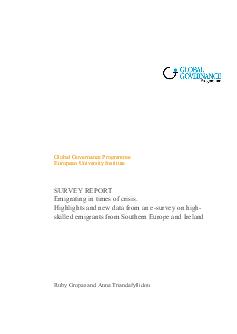Gropas, R. & Triandafyllidou, A. (2015) Survey Report: Emigrating in times of crisis. Highlights and new data from an e-survey on high-skilled emigrants from Southern Europe and Ireland, Global Governance Programme – European University Institute, Φεβρουάριος.
The issues at stake
Crises impact on migration trends and development in numerous ways. In general, remittances tend to fall and ‘brain drain’ tends to increase as high skilled individuals are prone to ‘exit’ in search of opportunities elsewhere. The outflow of high-skilled individuals may have significant long-term implications for a country’s economic growth potential and its competitiveness, while the inflow of talented, skilled workers may stimulate economic growth and enhance competitiveness.
Given the premium that is accorded to human capital in today’s ‘knowledge economies’ and the global competition over this scarce resource, it is urgent to better understand in what ways the current economic crisis and its consequences have impacted the decisions of high-skilled EU citizens from the most hard-hit countries to ‘vote with their feet’.
Over the past five years, residents of Greece, Italy, Portugal, Spain and Ireland have been hit by economic crisis, recession and harsh austerity measures. Unemployment reached record levels in countries that already faced high levels of youth unemployment. In fact, Greece, Italy and Portugal counted thehighest unemployment rates among young people aged 25-29 with tertiary education in 2007.
Unemployment and underemployment have not been the only consequences. People in Southern Europe and Ireland have faced a dramatic fall in their salaries and welfare benefits, and a substantial deterioration of their professional expectations.
The crisis had a number of far-reaching implications for the European Union, and one of these has been the way it has impacted intra-EU mobility. Intra-EU mobility had been steadily rising in the decade preceding the 2008 global financial crisis, and while mobility flows declined in the period 2008-2010, they quickly picked up again mainly triggered by flows from Greece, Spain and Ireland. Moreover, one particularly important dimension to note is that since 2010 there has been a significant increase in mobility of people with tertiary education. In effect, the percentage of those with a tertiary education among recent intra-EU mobile workers grew from 27% in 2007-08 to 44% in 2011-12.
Data presented by the OECD’s International Migration Outlook (2013) suggests that emigration from Ireland accelerated since 2009 and increased significantly particularly for Greece and Spain after 2010. Although precise numbers cannot be registered there are clear indications that crisis hit European countries have been experiencing significant emigration flows. Among those leaving, there are third country nationals who are returning to their country of origin or moving on to other destinations, and there are citizens -both native and naturalized- who are emigrating.
If we consider the extent, the duration and harshness of the crisis it seems that a surprisingly lower number of Greeks, Italians, Irish, Spaniards and Portuguese have emigrated than would have been expected. Yet those who have emigrated to other countries or continents, have captured much media attention and the prospect of continued emigration of the ‘youngest, best and brightest’ of these countries, has triggered notable public debate and concern.
Σχετικές αναρτήσεις:
- Carrera, S., Guild, E. & Eisele, K. (2014) “Rethinking the Attractiveness of EU Labour Immigration Policies: Comparative perspectives on the EU, the US, Canada and beyond“, Justice and Home Affairs, CEPS Paperbacks, 13 Νοεμβρίου.
- Preston, Ι. (2014) “The effect of immigration on public finances“, VoxEU Organisation, 05 Νοεμβρίου.
- “EU migration – a deliverable proposal for reform“, Open Europe Blog, 03 Νοεμβρίου 2014.




